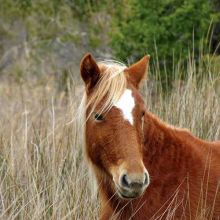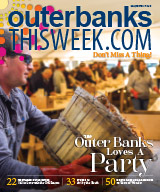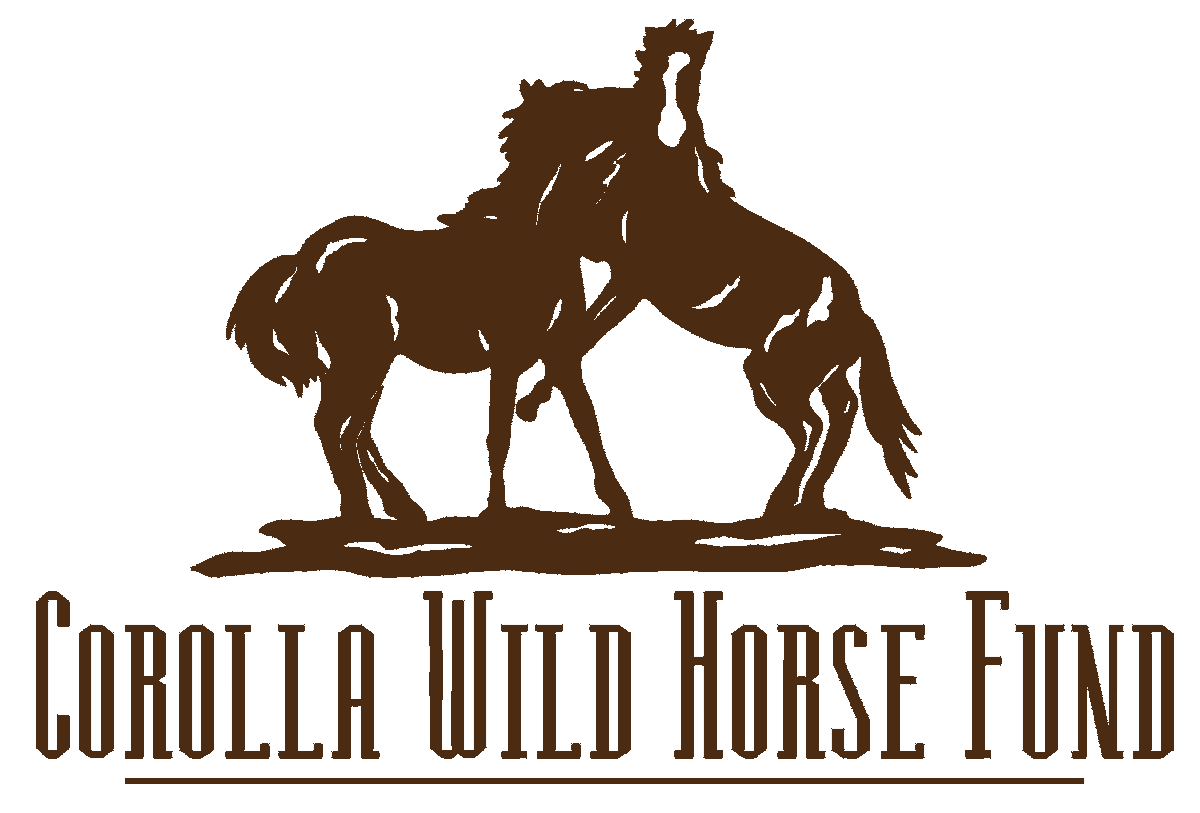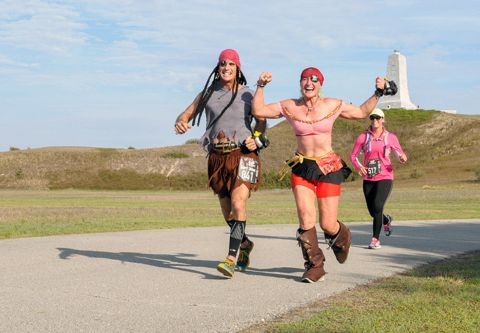
Genealogy, the study of family history and lineage, offers insight into one’s ancestry and provides answers about identity and heritage. It gives people a connection to the past, preserve family history and even solves mysteries.
The Corolla Wild Horse Fund (CWHF) has ramped up its genealogy efforts in the past few years to unravel the ancestry of a different kind of lineage, that of the endangered Corolla wild horses, aka Banker horses. With its DNA Research Project, CWFH is gaining a better understanding of these majestic creatures and the knowledge to protect them.
“It’s fun,” says Meg Puckett, director of herd management for CWHF. “It’s kind of like putting together a puzzle.”
The Banker horses have roamed the beaches for 500 years, ever since they were brought to this continent by Spanish explorers in the 1500s and learned to adapt to the barrier island conditions. In May of 1926 National Geographic reported that there were between 5,000 and 6,000 wild horses roaming the Outer Banks of the North Carolina coast, which means horses well outnumbered humans on the Outer Banks for centuries.
The horses’ numbers drastically dwindled over the years, especially in the population growth and development of the northern Outer Banks in the 1980s. In the decade following the paving of N.C. Highway 12 between the Currituck County line and Corolla, a total of 20 horses were struck by vehicles and killed.

A group of concerned Corolla citizens formed the Corolla Wild Horse Fund in 1989. Focused on strategies to prevent horse fatalities, the founders moved 20 horses that frequently hung around rapidly developing Corolla north to the 4x4 area, where an unknown number of wild horses were living. To contain the wild horses in this area, CWHF constructed sound-to-sea fences on southern and northern borders of the 4x4 area.
Incorporated as a 501(c)3 nonprofit charity in 2001, CWHF has grown to focus on herd management, conservation efforts, education and outreach, rescue and rehabilitation, advocacy and research. Thanks to its work, there are now 120 horses in the wild herd and 22 at the CWHF rescue farm in Grandy on the Currituck mainland. But there is still much work to be done, as the horses continue to face threats from illness, collisions with vehicles on the beach and humans feeding them inappropriate food like apples and carrots.
With rapid development in the 4x4 area and 70 percent of the land the wild horses roam being private property, CWHF is constantly working on acquiring more land for the horses with its land preservation initiative. The organization also dedicates significant efforts to data collection, with at least one staff member on the beach seven days a week, 365 days a year monitoring and recording data.

In 2020 CWHF began expanding its genealogy efforts with the DNA Research Project, aiming to record the DNA of each Banker horse and form family trees to better understand and protect the horses. The staff collects the DNA by using a dart gun specifically designed to collect tissue samples. When the dart hits the horse it collects hair follicles that contain the horse’s DNA. The sample is sent to Texas A&M for analysis, then the CWHF staff compares the analysis with other DNA samples, currently 150, to determine relationships and family trees.
Understanding the horses’ family lineage helps CWHF be better equipped to address many issues, from health conditions to behavior, especially with the horses they have to remove from the herd to take care of on their farm in Grandy – a step taken only when absolutely necessary.
“For example, a lot of the horses have issues with their eyes,” Puckett says. “So is that a genetic thing that we can maybe test for?”
Puckett explains that by analyzing the DNA and ancestry of the wild horses, CWHF is able to gain insights into the horses’ personalities, behaviors and attitudes, as these traits can be passed down genetically. “It gives you a really good idea of those kinds of genetic traits that get passed down,” she says.
To do all of this work, CWHF depends on donations, volunteers and support. Here’s how you can help.
• To donate, become a member or contribute in a number of ways, visit corollawildhorses.com/support-corolla-wild-horse-fund/
• Tour the Corolla Wild Horse Fund Museum and Gift Shop at 1130E Corolla Village Road in Historic Corolla Village to learn more about the horses and shop among apparel, accessories, gifts, jewelry and art. All proceeds benefit the horses.
• Visit formerly wild, rescued Banker horses at the Betsy Dowdy Equine Center at 102 Young Rider Land in Grandy. Check the website for open house events. The farm’s gift shop is fully staffed with people who can answer questions and talk about the horses, and its stocked with items to buy to benefit the horses.
• Shop for merchandise online at corollawildhorses.com/chwf-gift-shop
Butts to the Wind
Why does Corolla Wild Horse Fund sell t-shirts, stickers and towels with the slogan Butts to the Wind?
“What do the horses do when there’s a hurricane or a bad storm?” Puckett asks. “They huddle up. They put their butts to the wind and hunker down … you know, kind of like we all do."
1130 E Corolla Village Road, Corolla
(252) 453-8002



 Maggie Miles is originally from the Outer Banks. She moved to Palm Springs in 2023 to work as an on-call reporter for the New York Times. Her portfolio includes contributions to The Times, BBC, MSN and many other media outlets. During her career, she has focused on a wide range of topics, including workplace corruption, gun violence, social justice, the environment, arts, health and wellness, travel and in-depth profiles of notable people and businesses.
Maggie Miles is originally from the Outer Banks. She moved to Palm Springs in 2023 to work as an on-call reporter for the New York Times. Her portfolio includes contributions to The Times, BBC, MSN and many other media outlets. During her career, she has focused on a wide range of topics, including workplace corruption, gun violence, social justice, the environment, arts, health and wellness, travel and in-depth profiles of notable people and businesses.




